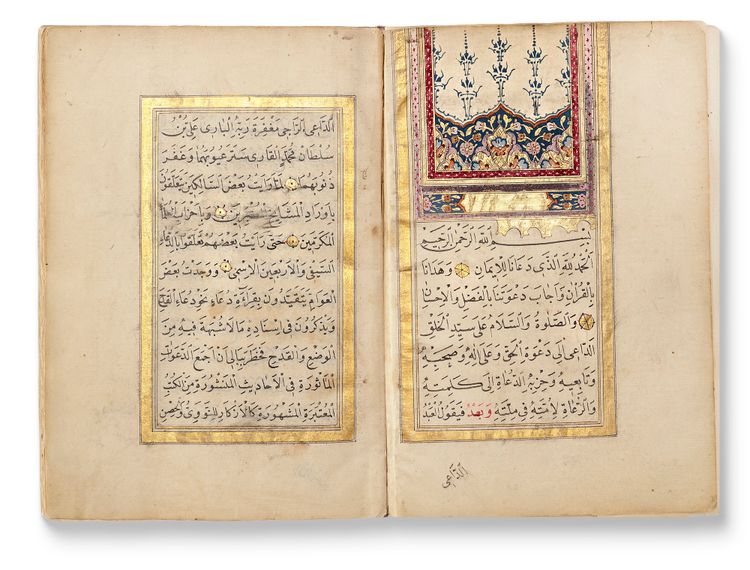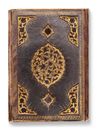Lot 23 AN OTTOMAN PRAYERS BOOK, AL-HIZB AL-A'ZAM AND DALA'IL AL-KHAYRAT, WRITTEN BY THE SCRIBE WALI AL-DIN KNOWN AS AL-ADIB AND DATED 1185 AH/1771 AD
Arabic Manuscript on Paper: Devotional Prayers in Honour of the Prophet.
An exquisite Arabic manuscript on paper, comprising prayers in praise of the Prophet. Each folio features 11 lines of elegant black naskh script, with gold verse markers accented by polychrome dots. Selected words are highlighted in red. The text is framed within double gold and red ruling.
The opening bifolio is richly illuminated with royal gold and polychrome decoration. The manuscript also contains two finely rendered illustrations of the holy cities of Mecca and Medina, depicting al-Masjid al-Ḥarām and al-Masjid al-Nabawī, respectively. Additional features include the Beautiful Names of Allah (al-Asmā’ al-Ḥusnā), various honorific names attributed to the Prophet, and occasional marginal floral motifs.
The colophon is signed Wali al-Dīn and dated 1185 AH (1771–72 CE).
Housed in its original tooled and stamped gilt brown morocco binding with envelope flap.
Dimensions: 11.5 by 15.5 cm.
Catalogue Note:
Al-Ḥizb al-Aʿẓam wa al-Wird al-Afkhm
("The Supreme Litany and the Most Glorious Devotion")
This manuscript likely represents or draws inspiration from Al-Ḥizb al-Aʿẓam wa al-Wird al-Afkhm, a distinguished compilation of devotional supplications (adhkār and duʿāʾs) rooted in authentic Prophetic traditions. The work was compiled by the esteemed Persian scholar Mullā ʿAlī ibn Sulṭān Muḥammad al-Qārī al-Harawī, and includes a carefully curated selection of Qur’anic invocations, authenticated Prophetic supplications, and formulas for invoking blessings upon the Prophet.
In his introduction, the author emphasizes his goal of excluding weak or fabricated prayers and instead relying on authoritative sources such as al-Nawawī’s al-Adhkār and al-Jazarī’s al-Ḥiṣn al-Ḥaṣīn, providing a spiritually sound guide for worship and remembrance.
About the Author:
Mulla Ali al-Qari, born in Herat, was a polymath and leading Islamic scholar of his time. Renowned for his expertise in Qur’anic recitation, ḥadith, jurisprudence, theology, linguistics, and literature, he held a prestigious position in the intellectual landscape of the Islamic world.
Dala’il al-Khayrāt
("The Proofs of Good Deeds")
This manuscript may also reflect influence from the famed devotional text Dalā’il al-Khayrāt, composed by the Moroccan Sufi master Imam al-Jazuli (d. 1465). This deeply heartfelt collection of ṣalawāt—prayers and blessings upon the Prophet —emerged from the Sufi tradition and soon gained widespread popularity across the Islamic world.
Dala’il al-Khayrat became the most celebrated and widely recited book of ṣalawāt, inspiring generations of calligraphers, illuminators, and court artists to produce sumptuous copies reflecting the artistic styles of various Islamic dynasties. These devotional manuscripts not only reflect spiritual reverence but also preserve the artistic heritage of Islamic craftsmanship.
The tradition of reciting Dalā’il al-Khayrāt in both public gatherings and private devotions continues to this day.



